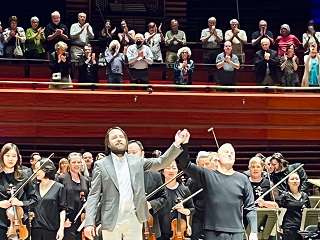|
Back
Philadelphia Orchestra Opens Season With Gershwin à la Trifonov Philadelphia
Verizon Hall, Kimmel Center
10/06/2023 - & October 7, 8, 2023
George Gershwin: Concerto in F
Anna Clyne: The Moment
William Grant Still: Symphony No. 4 “Autochthonous”
Daniil Trifonov (Piano)
The Philadelphia Orchestra, Yannick Nézet‑Séguin (Conductor)

D. Trifonov, Y. Nézet‑Séguin (© Diana Antal)
The Philadelphia Orchestra under Yannick Nézet‑Séguin offered its first subscription series concert of the season October 6 in Verizon Hall with a zesty program performed with the Maestro’s signature ebullience and bravado. Daniil Trifonov, the popular Russian pianist who lives in New York, soloed in Gershwin’s swingy Concerto in F, followed by The Moment, a short but monumental tribute to Mozart’s Requiem by Anna Clyne, and William Grant Still’s billowing Symphony No. 4 “Autochthonous” (a word which refers to indigenous inhabitants).
The works by Clyne and Still had a sense of profound introspection and depth largely lacking in the Gershwin. In the performance of the Concerto, volume and speed took up the slack, resulting in a cheerful, sometimes noisy but always good‑natured production. I especially enjoyed the largely quiet second movement with some brilliant trumpet solos by guest principal, John Parker. Parker brought nuance and individual expression to each solo passage, as though he were telling a richly embroidered story, and seemed perfectly at ease with the jazz inflections of Gershwin’s writing.
I was curious as to how Trifonov would fare with the Concerto in F. He is known for the lush romanticism of his interpretations and the spiritual aura of his stage performances. Previously, I had not heard him play in the jazz style, although he is an enthusiastic performer of modern works, such as Mason Bates’s Piano Concerto and his own compositions. The answer to this conundrum was two‑fold. Trifonov was brilliant. I doubt he can play a bad note. And yet, there was something missing in his playing that I hadn’t observed or heard in the past. Was he trying too hard, reigning in the power like an opera singer approaching a pop tune? It’s hard to say. However, the overall confluence of orchestra and piano was enjoyable and, in its own way, true. All was redeemed when Trifonov played as an encore Debussy’s sparkling “Reflections on the Water,” a petite Impressionist masterpiece which, under his touch, shimmered like a sunbeam.
Anna Clyne’s The Moment received its world premiere with this orchestra in July. Inspired by the Zen calligraphy of the late monk, Thích Nhất Hạnh, The Moment rises in its opening from a chant-like hum to a cymbal’s whisper, flooding the hall with wisps from Mozart’s Requiem and Clyne’s own perspective on mindfulness. I would love to hear a long, complex work by this amazing creator, already one of our major compositional stars. Orchestras are happy to administer postage-stamp-sized doses of new music at concerts, but shy away from longer works for fear of scaring off audiences. There is nothing to fear in many of our best providers of new symphonic work. Let’s hear longer selections by these talented artists!
The program concluded with Still’s grand Symphony No. 4, a work of scope, originality, and vitality. Exemplary of that originality is a deep, soul‑shaking final movement that swells into an affirmation at the work’s conclusion. Let’s hope we’ll hear more performances of Still’s 20th century contributions to the American classical tradition.
Finally, on a light note, I have often included in reviews a mention or two about the attire of musical performers. Dress and fashion can be an artistic statement, and often reflect cultural values. So, at the Friday matinee, I watched with interest what may be a “famous first” at the podium.
Introducing the program, Yannick bounded onto the stage wearing what I at first thought were navy‑blue pajamas. I noticed because I have a pair just like them. Listening and continuing to observe, I finally identified his ensemble as a sweatshirt and workout pants. Yannick then disappeared behind the curtains, and concertmaster David Kim appeared, to lead the tuning. I expected Yannick would quickly change into a jacket and pants. But no! The enthusiastic maestro returned wearing a big smile and the same rumpled workout togs, shepherding the guest soloist. And so he conducted the entire program. Times are changing in the world of symphonic music. I see in this sartorial shift the erosion of restrictions and the gradual awakening of an egalitarian spirit appropriate during a tense period of union negotiations. Fashions come and go, but music outlasts them all.
Linda Holt
|